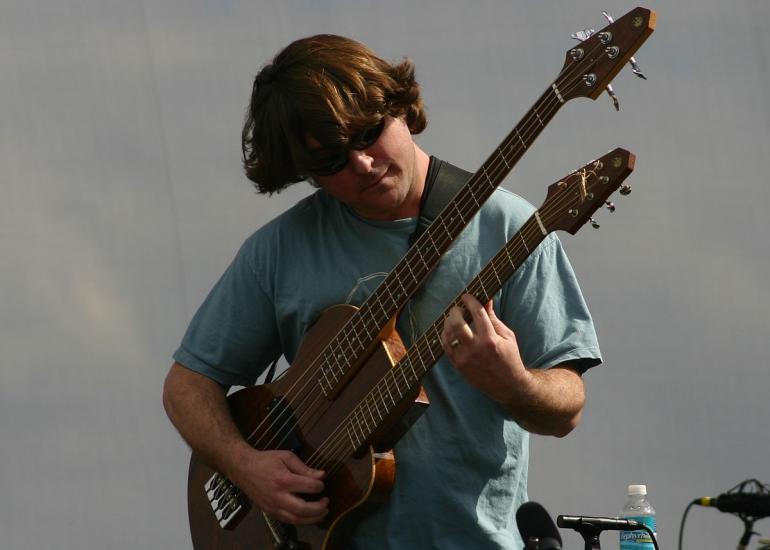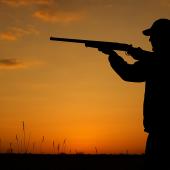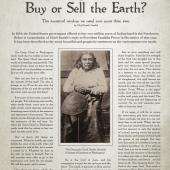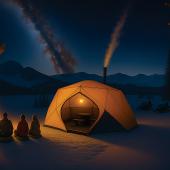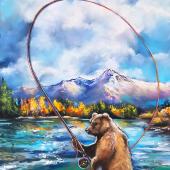Keller Calling
An interview with the king of energy.
In late April, the Emerson Cultural Center hosted the looping, beat-boxing one-man-band known as Keller Williams. Keller wowed the sold-out crowd for almost three hours, creating multilayered grooves with his guitar, voice, and any soniferous device within arm’s reach. The enthusiastic, sometimes raucous crowd—an interesting combination of dreadlocked students, curious forty-somethings, and fans of good music in general—stood for the entire show. At its conclusion, Keller thanked his audience for generating “the most energy from a crowd in a long time.” Recently, Outside Bozeman had the pleasure to ask the virtuoso about Bozeman, the outdoors, and his unique style.
Outside Bozeman: You’ve played in Bozeman before. Have you ever spent much time in the area?
Keller Williams: I’ve been there about eight times. I did the Zebra a few times, the Emerson in ‘97, and I’ve played the college at the atrium in the middle of campus. But I’ve basically just been in and out for gigs.
OB: What are your impressions from your time in Bozeman?
KW: Playing the in the atrium in the middle of campus was pretty weird, kinda like a shopping mall. I like the young and hungry people of the town, the Rocky Mountain people—always good people to play for.
OB: Are you much of an outdoors person?
KW: Sure. I’m outdoors right now.
OB: What are your favorite outdoor-related activities?
KW: I like to snowboard. I lived in Steamboat Springs for a few years—I had skied my whole life, and then moved there and started to snowboard. Now I live on a slow-moving river, so I get out on my kayak a lot. I also like to hike with my daughter in my backpack.
OB: If you had to be one animal, what would it be? Why?
KW: Maybe a bald eagle—just fly and be cool.
OB: What is the name of the instrument with the antenna that you played by moving your hands closer to or farther from it? How did you discover it?
KW: That’s called a theremin. I think I saw Joseph Wooten, Victor Wooten’s brother, playing it. [Victor plays bass in Béla Fleck and the Flecktones.] It’s a really interesting instrument, in the sense that it’s visual and unique and difficult to play. A lot of folks are really good on it—virtuosos, so to speak. You can Google it and get some video from people playing back in the 50s. It’s a unique, beautiful instrument, and when it’s played correctly, it sounds like a violin.
OB: Do you prefer to play in smaller or larger cities?
KW: I think a mixture of both is really good. I like playing the major markets like San Francisco, New York City, St. Louis, Seattle. It’s all good and exciting and the numbers are pretty decent. And playing a small college town is pretty cool, too. My favorite venue is probably Red Rocks [in Morrison, CO]. I also like The Egg in Albany, NY; it’s a cool round room.
OB: Can you explain your instrument that looks like a bass-guitar hybrid?
KW: I call that guitar “Zilla” because it’s pretty much a monster. It’s got six guitar strings, two bass strings and two separate outputs that amplify each on different channels. I got the idea from [groundbreaking guitarist] Charlie Hunter, who is pretty much a maestro of the instrument.
OB: How did you start looping, beat-boxing, etc., and how long did it take you to get comfortable enough with it to perform in public?
KW: I started rehearsing on stage during shows. When I started doing it there was no cover charge and not much attendance, so there weren’t many boundaries for me. I pretty much learned on the stage.
OB: What can you say about the differences between playing with others and playing solo over your own loops?
KW: Playing with humans and collaborating with other people is always the best. And playing solo has an infinite amount of freedom and it really started working for me several years ago. It’s hard to abandon something that’s working. I love playing alone and with others; the different aspects of each help me want to do the other more.
OB: What’s in your CD player now?
KW: Toots and The Maytals, and a band out of Nashville called Toubab Krewe. [The latter] plays heavy, African-type music—“toubab” translates as “foreigner” [in West African dialects]. They’re some fresh young players moving in new directions.
OB: Besides music, what are you active in or passionate about?
KW: My family. I stay away from politics and on the lighter side of things. I don’t like to mix them together.


